A SON OF THE CHURCH
I. Teacher, Parish Priest, Founder
(1948-1966)
LOOKING back over his entry into the seminary in 1943, Fr. de Nantes wrote: « I entrusted myself to the Church like a child to his mother, in order to receive everything from her and from no one else. Now, what an unforgettable wonder, she came up to my expectations, she adopted me as one of her own. (...) I received my first Catholic heritage and my first clerical imprint in the Church of all time, in the absence of all contestation and division, I can say that I am the legitimate child of this Church, I am her truthful and faithful witness. Had I entered a year later, I would not have had this opportunity, and I would not be able to vouch for anything. From the start, I would have been the member of a party, of a faction, and necessarily against the others. (...) As it is, I identify with the Catholic totality wherein I was born into clerical life in this year of 1943-1944, simply, peacefully devoted to the Church and accepted by her unreservedly. »
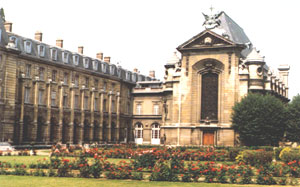
Now, as a son of the apostolic Roman Catholic Church, Fr. de Nantes would be led, starting in 1944, to defend this Holy Mother against two antagonist parties originating from within herself. Against those among her children who want to “ reform ” her, to the extent of altering her divine constitution as Spouse of Christ in order to make her espouse the world, he would not rest until she sent away the intruder, namely the world and all its “ religions ”, in order to come back to her unique Spouse, Our Lord Jesus Christ. Then, once the “ reformer’s ” faction had carried the day at the end of the Second Vatican Council, he had to defend her against those who no longer wanted to acknowledge her as their Mother. (...)
A SIGN OF CONTRADICTION
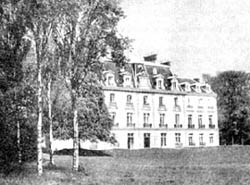
The Mansion.
In 1954, I was in the final year of philosophy at Saint-Martin de Pontoise College. And the philosophy professor was Fr. de Nantes. (...) He had been expelled from the diocese by Cardinal Feltin. For what reason ? Since 1949 he had been a contributor to Aspects de la France, the journal of Action Française, writing under the pseudonym of Amicus, with a theologian’s competence which exasperated these gentlemen from the Archbishop’s House in Paris. But in April 1952, setting aside all prudence, Amicus, used his real name, “ Fr. Georges de Nantes ”, when in the city of Nantes, he gave a conference, the title of which was “ The M.P.R. (Mouvement républicain populaire) conveyor of Communism ”. What a scandal it was in this Christian Democratic stronghold ! The Prefect of Nantes alerted the Prefect of Paris who transmitted the complaint to the Archbishop. (...)
The Bishop of Grenoble, Bishop Caillot, who was his own bishop and fended for him, wanted to appoint him professor of moral philosophy at the Major Seminary of Rondeau, but the superior refused to accept him. This is when Fr. Dupré took him in and sent him to Saint Martin’s, where Fr. Tourde, the college’s superior put him in charge of thethird-year religious instruction class.
One year went by, absorbed in the preparation of a doctoral thesis on “ The Metaphysical Structure of the Person ”. (...)
At the start of the new academic year, the college was deprived of its philosophy professor. With his four licentiates and his vast erudition, Fr. de Nantes was the ideal person to fill the position. He became professor of philosophy and “ house master ” at the “ Pommeraie ”, according to the system that divided the six hundred students of this magnificent college among several proprieties that were all joined into one single park. (...)
A SCHOOL OF THOUGHT
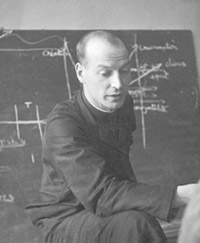
He was an extraordinary professor. The 100 % success rate at the final examinations of that year suffices to prove this. Without the slightest concession to the prevailing errors of the post-war and post-liberation period, he already taught the “ whole ” truth with an infectious enthusiasm. Theology was the first master, through the religious instruction course which we no longer thought to heckle, as was the tradition in this liberal college. “ The cycle of the Father, the cycle of the Son, the cycle of the Holy Spirit ”, introduced us into the only religion that established between Heaven and earth bonds of a circumincessant and divine charity: the Son of God becoming Son in this world, the Son of Mary, in the village of Nazareth, teaches us to love every kind of filiation on earth. (...)
I remember that during our end of studies retreat,which was preached by a Dominican filled with a revolutionary spirit, he warned me against my philosophy professor. And for what reason? Because he was “ Action française ”. I was wide-eyed. I knew nothing about A.F., of which the Abbé de Nantes had not even spoken.
It is true that the “ relational ” crux of his religious instruction course, issued from a philosophy which was the principal object of our studies for the final examination: A total and prime Truth that posited every “ human person ” as a “ creature ” considered not only in his “ nature ”, but in his origin. Aristotelian-thomist realism, boldly professed before our examiners, immunised us against Kantian idealism, a « mental illness » chosen as an optional subject for the oral examination, with the study of the preface of the second edition of Criticism of pure reason. But our professor pointed out to us that Aristotle, and therefore St. Thomas, lacked the consideration of the « relationship of origin », through which each one is lead to discover his « vocation ». A morality diametrically opposed to human rights emerges from this, which teaches us to consider null and void, the so-called “ dignity of the free, autonomous and independent human person ” (‘ dignité de la personne humaine, libre, autonome et indépendante ’). ” (...)
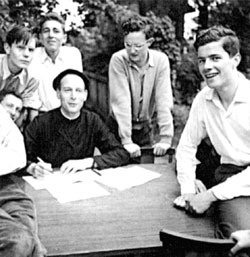
We were captivated. A flood of light was generously imparted not only in class, but during meals, recreations, at the chapel, from morning to nightfall. All this occurred without weariness either on the part of the master or the students. It immunised us against idealism, as I have said, against racism, against socialism and against the democratic pride that was illustrated by the current events that he explained to us. For, he spoke to us about politics, as Edith Stein had done with her own students during the inter-war period. And this is perhaps what gripped us the most.
But this was also what began to worry the Oratorians… The haunting question ran: « Can a priest be involved in politics ? » To this question, Fr. de Nantes gave the same reply as they did: No ! Politics is not the priest’s trade, nor is it that of the farmer, the craftsman, any more than it is that of the philosopher. Politics is a royal work, and it must be practiced by the King alone. This is how we became monarchists for life! This occurred even before ever having spoken of Action française, whose very name he did not pronounce throughout the entire year. (...)
« Legitimacy is a reality that religion guarantees and strengthens », he taught us. From 1940 to 1944, this principle prevailed. All the bishops joined Cardinal Gerlier in saying: « Pétain is France; and France is Pétain. »
This provoked a new psychodrama in our class: we had a classmate whose father, an important member of the “ Resistance movement ”, had brought him up to adulate De Gaulle. With countless precautions, Fr. de Nantes showed him his father’s error, while at the same time teaching him the reverence that he should have towards his father. This was the great revelation of that blessed year: the service of the “ truth ” outweighs all other considerations. Joan of Arc’s example when she left her father and mother at the call of the Voices demanded that we fulfil our sacred duty with the same generosity, the same disinterestedness, whatever the consequences might be. For, however powerful, however firm they were when it was a question of ensuring the political mission, the heavenly Voices remained silent when Joan questioned them concerning her particular destiny: « I asked my Voices if I will be burned at the stake; they told me to put my faith in Our Lord, and He will help me. »
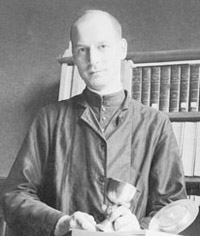
The “ truth ” is just as sacred in the field of historical science, the object of rigorous study, as in that of dogmatic faith. From the moment when it is well established that Pétain was the providential saviour of France, and De Gaulle, her infernal wrecker, it is a sin against God to approve of those who sent the Maréchal to prison, just as it is to approve of those who burned Joan of Arc, or those who crucified Jesus Christ. France still suffers from all the consequences of this “original sin”. (...)
It may be said that this line of conduct, inspired by the example of Joan of Arc, justifies Fr. de Nantes’ vocation of explaining politics to us for fifty years. He does it with such lucidity that events have always proven him to be right. They came at the price of persecutions. (...)
In 1955, he left Saint Martin’s to enter the Carmel. But the Carmelite Fathers, who had been warned by Fr. Tourde, refused to accept him. How can we bear a grudge against him ? Brother Gerard was about to follow Fr. de Nantes; he was burning with enthusiasm, while I was sulking. If our Father and Brother Gerard had been admitted, today they would be prisoners, handcuffed and gagged like Sister Lucy in her Carmel at Coimbra. Yet, filled with Elijah’s spirit, he remained true sons of St. John of the Cross in order to serve the « living God »; they were free and refused to bend the knee before the idol…
Let us admire the ways of Providence ! Nevertheless, at that time, only one thing was certain: he was out on the street, with his cartons of books, once again not knowing where to go. (...) Driven out of Pontoise, he found refuge at the College of Normandy, where André Charlier was only too happy to acquire such a professor ! (...)
MISSIONARY MONK
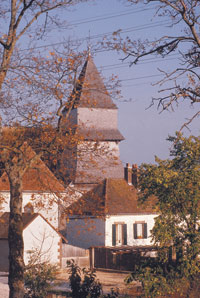
In the foreground, the rectory. « When I visited his house, I saw what he sleeps on. Yes, he is a great soul.» (Bishop Le Couëdic)
In October 1956, he sent Letter number 1 to seventy friends: « “ In the evening of life, only one thing is left: love. Everything must be done through love. ” Reflect on these words from the Carmel; they will be a soothing light for you in the trials of your life. » What does it teach us ? A truth that is the grace of the first eight years of his priesthood: « God is good when He “ breaks one’s career ”. All false grandeur and all false riches are thereby taken away, and if one receives the grace of losing all hope of ever regaining them, then room will be found for the true wealth of contemplation. To all of you, I wish such a break. » Really ? So we can understand why the “ Friends ” to whom the letters were destined, were never crowds… (...)
That year, a book whose importance Fr. de Nantes immediately understood, was published on the origins of Islam: it was the first work to break with « the age-old attitude of the East and the West towards Islam that was characterised by simple acceptance of its pretended origins. A man took the liberty of reading the Koran like a document of the past and of seeking to explain it by the simplest laws of historic methodology that has been used for ages within Catholicism in the study of the Bible. »
Now, since 1938, at fourteen years of age, Georges de Nantes had heard Charles de Foucauld’s call to come to the help of the souls of the infidels for whom France had taken the responsibility of colonising. The concern for scientific, exegetic and historical “ truth ” was more important than ever, since it would be the preliminary to any missionary project in Islamic countries. His failure to enter Carmel had not made him abandon the desire of becoming a monk: a missionary monk in imitation of Father de Foucauld. When he confided this desire to Fr. Théry, he advised him to write a Rule that he would take upon himself to submit for approval to a bishop from among his numerous friends.
This is what in fact happened. Our Father wrote in one go the one hundred and twenty articles of a “ provisional ” rule, under which, ever since then, we, the Little Brothers and Little Sisters of the Sacred Heart accomplish our noviciate so as to one day be worthy of canonical recognition, at the hour that God will chose. (...)
Bishop Le Couëdic of the Diocese of Troyes, proposed to Fr. de Nantes to undertake the planned foundation in his diocese. This is how on September 15, 1958, for the centenary of the birth of Charles de Foucauld, we sang the first vespers of the feast of Our Lady of the Seven Sorrows in the church of Villemaur.
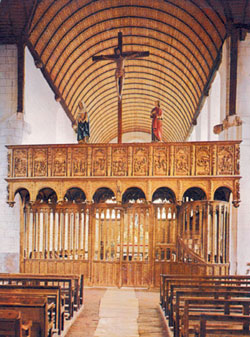
During five years, the founder of the Little Brothers of the Sacred Heart devoted himself to an intense parochial ministry. (...) During this time, we were finishing our licentiates in Scholastic Philosophy at the Catholic Institute, and Literature at the Sorbonne, and we then left for twenty-seven months of military service in Algeria. October 1959-December 1961: it was subsequent to the national outburst of May 13, 1958, the most favourable moment for a providential “ period of instruction ” in this Christian land. (...) It was at this time that Bishop Le Couëdic allowed us to don the monastic choir habit, the white Cistercian cowl, an indication of his firm resolve to establish us truly as a community of missionary monks.
Yet we were rapidly warned that this foundation would soon become intolerable to all the political, ecclesiastic and administrative powers. (...)
The dreadful drama of our French Algeria was reaching its height of injustice and horror; this compelled our Father resolutely to enter into the struggle to defend her, but to the detriment of the canonical recognition of the Little Brothers of the Sacred Heart. (...) For, Msgr. Philippe, a Dominican who was Secretary of the Sacred Congregation of Religious, gave a positive response… on one condition: « The text of this Rule might well be approved by the Sacred Congregation and your projected foundation could take place. » But, he added, « what creates a problem is your political commitments… your defence of French Algeria… Here, at Rome, this French prelate said, such an attitude cannot be understood. You must absolutely abandon it. »
He obtained this proud reply: « Excellency, the defence of my assassinated brethren, is in any case, an imperative duty imposed on me by Christian morality; recognition of the Order, which I have just requested of you, depends only on God’s good pleasure. If this design is in keeping with His Will, it will come about in due time. I could not pay for this official recognition at the cost of an immoral act that certainly is gravely culpable. »
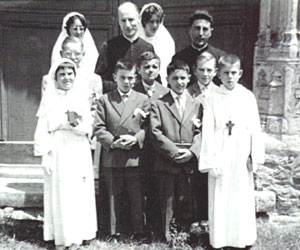
This is why we are still not recognised. From the pulpit of truth, the parish priest of Villemaur, Pâlis and Planty continued to recall to his parishioners their duties of justice and charity towards their Christian brothers and fellow French citizens who had been handed over to fellagha knives: « Brethern, how can you expect me to teach your children not to kill and not to lie, when it is the head of State who gives them an example of lying and homicide ? »
On March 14, 1962, four inspectors presented a search warrant and an order for Villemaur’s parish priest to be kept under police surveillance. They took him to the police station. The statement that he made enraged the Prefect, because Fr. de Nantes reproved and declared to be disgraceful « the clever acts of perjury and treason of the head of State » and refused refuse « the most shameful capitulation in our history that he is determined to sign… » (...)
Since he did not dare intern his prisoner, the Prefect called the Bishop to ask him to lock up this troublesome priest… in the Major Seminary… that was devoid of seminarians. (...) His first “ captivity ”. But not the last…
A few days later, he confided to us: « (...) I had to endure meetings with His Lordship that were much more painful than the interrogations of the police. There is a wall of incomprehension that cuts us off now from our confreres or superiors. »(...)
Fifty years after All Saints Day, 1954, when the carnage began, we are still at the foot of the same « wall of incomprehension ». And Algeria, which was abandoned by us, is more than ever put to fire and sword.
SUSPENSION “ AB OFFICIO ”
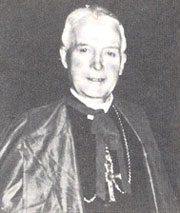
(...) On April 1, “ Laetare ” Sunday, he returned to his parishes and went up into the pulpit: « A priest is obliged to tell the truth. When he disregards truth and good, an infernal chain of lies begins. » However the Prefect did not lessen his pressure on the bishop, ordering him to depose the parish priest of Villemaur. (...)
At first, Bishop Le Couëdic seemed to want to carry on regardless and keep his promise of supporting the projected foundation of Fr. de Nantes, of whom he would say right to the end of his life: « He was certainly the most well instructed of my priests, the soundest theologian. (...) » Bishop Le Couëdic was full of praise concerning « his elevated spiritual life. (...) » Then how and why did this bishop come to remove him from his office of parish priest at Villemaur, Pâlis and Planty, asking him to leave the diocese of Troyes ? For the reason that our Father would soon express in a pithy phrase to Bishop Le Couëdic himself: « I was the first victim of the Conciliar revolution. »
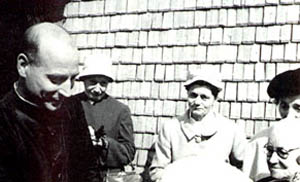
This revolution had been developing for a long time. Our Father had detected its harbingers in 1944, in the “ liberated seminary ” at Issy-les-Moulineaux. Fifteen years later, he implacably criticised it in his Letters on The Mystery of the Church and Antichrist. It was after the death of Pius XII and the accession of John XXIII, in 1958, acclaimed by the entire left-wing intelligentsia as the end of one world and the dawning of a new era, that of Pacem in Terris. (...)
On October 11, 1962 the Second Vatican Council opened. During this first session, Brother Gérard and I were refused advancement to Holy Orders by the Council of the Carmelite Seminary. A bad spirit began to blow against all the traditional institutions that we loved. (...)
THE FOUNDATION OF MAISON SAINT-JOSEPH
Our Father found himself, put on the sidelines, in a de facto « withdrawal of obedience », due to the will of his bishop, and not due to his own initiative. We moved into Maison Saint-Joseph, which was acquired thanks to the generosity of our friends. Despite Bishop Le Couëdic’s repeated entreaties, our Father insisted on remaining in the diocese of Troyes, since we were honourably known there. He was willing to recommend us as being the best of his diocese to any other bishop, provided that we leave ! We began our community life on September 15, 1963, five years after our foundation.
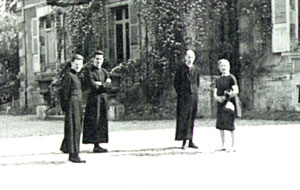
Relieved of all “ office ”, our Father was free to follow the unfolding of the Council when the second session of the Council was beginning. He immediately understood what was at stake in the debate on collegiality, what its objective was, and which ended in what Fr. Congar himself called the « October Revolution ». (...)
Even then, a strong minority resisted in the Conciliar aula, and I remember how our Father was concerned about fighting alongside them with all his strength and all his influence; his action took the form of circulating the Letters to my Friends in Rome. (...)
« In fact, this debate can only lead to catastrophes. (...) It was necessary to avoid recalling truths that were too austere if the men of the Church were too cowardly to shoulder the burden, or to proclaim them proudly and paternally in the face of the modern World, which does not accept them and dies for want of them. But discuss them, never! The Church cannot stray from them without disavowing them and committing apostasy. Freedom comes from God alone. Perfect human freedom belongs to Jesus Christ alone and, in the divine gift that He made of it, to the Catholic Church. (...)
« To say that it is violent for the Church to demand for herself what she refuses to others is to lead minds astray, it is to renounce the true God, the true faith, the unique Church of Jesus Christ. The objective is to judge things no longer except from the point of view of Man, an autonomous and absolute being who has taken God’s place and is free to believe and to act without restriction ! »
Ultimately, the session ended without the proclamation of religious freedom that had been so desired by the “ reformers ” for the centenary of the Syllabus, so as to blot out its very memory.
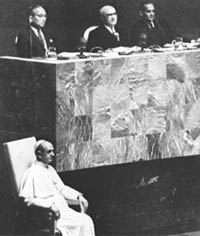
So, to make sure of carrying it off during the closing session, Pope Paul VI went to proclaim it at UN headquarters in Manhattan, on October 4, 1965, the feast of St. Francis of Assisi. On that day, « the spirit of Assisi » descended on Manhattan, to give life to the Movement for the Spiritual Animation of Universal Democracy, MASDU, « in the political sphere, an absurd and criminal dream, and in the religious sphere, an apostasy, a denial of Jesus Christ. » (...)
Without invoking any divine authority, John-Baptist Montini (...) did not praise God, but the Organisation founded on « the fundamental rights and duties of man, his dignity, his freedom and above all, his religious freedom. »
This is how Pope Paul VI forced the hand of the Council, where a minority still resolutely voted against « the unthinkable schema on religious freedom », as Archbishop Lefebvre said, before rallying over to it himself. (...)
The Pope, however, did even worse on December 7, 1965, the day of the Council’s closing, when he proclaimed: « The religion of God made man has come up against a religion – for there is such a one – of man who makes himself God. And what happened ? An impact, a battle, an anathema ? That might have taken place, but it did not. (...) Do you at least recognise this its merit, you modern humanists who have no place for the transcendence of the things supreme, and come to know our new humanism: we also, we more than anyone else, have the cult of man. » »
Not a single bishop could be found to refuse to bend the knee before the idol. No! There was neither « impact », nor « battle », nor « anathema ». Except against… Fr. de Nantes, and against him alone, because, like Elijah he alone remained a « free man among the dead », a prophet of purely Catholic fidelity.
On the same day, through an extraordinary penetration of the thought of Paul VI, our Father unwittingly contradicted, word for word, his speech: « This is the final combat of Rock against Rock, of Manhattan against Rome, of the God-man against the Man God and, according to St. Paul’s declaration, tragically omitted from Ecclesiam Suam, of “ Christ and Belial ”. »
SUSPENSION “ A DIVINIS ”
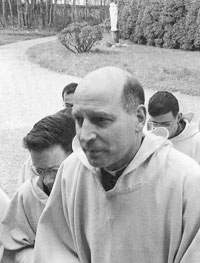
Before leaving Rome to return to their respective dioceses, the French bishops decided to publish a warning against Fr. de Nantes. Bishop Le Couëdic was at their forefront, thinking that he could easily silence this importunate opponent of the Conciliar “ Reform ” by enjoining him to:
1 leave the diocese,
2 stop publishing the “ Letters to my Friends ”, on pain of suspension a divinis, that is, to be deprived of celebrating Holy Mass.
The Bishop’s aim was to have him leave the diocese, and he did not doubt that he would be obeyed by a priest who was soon to write: « I realise in fact that it is at Mass, by threads more or less invisible, that my whole life has always been held, my morning, my midday and my evening. »
That was to fail to understand that the Catholic faith was at stake. Fr. de Nantes replied to his Bishop with a clear summary of the doctrinal motives of his opposition to the Conciliar reform and appealed to Rome to obtain a judgement on the substance:
« If I surrendered – not to your reasons, you do not give me any, no one gives me any from an authoritative source – but to the terrible threats of your spiritual power, (...) I would be unable to do so without losing my faith in the Holy Church of Jesus Christ…
« To be able to accept the current course of events, I would have to identify the Holy Spirit with the cunning of the modernist faction; I would have to identify the holiness of my Mother the Church with the passion of adultery and the prevarication that is raging everywhere; and identify the divine government, with the sordid diplomacy, the universal demagogy that floods everywhere. That is what the Church is? It is impossible to admit this without losing the faith! »
A truce followed during which our Father commented on our Roman Catholic Creed in a series of Letters written from February to July 1966. (...)
In order to open the trial in Rome, our Father wrote an official letter to Cardinal Ottaviani, the Prefect of the Holy Office. Bishop Le Couëdic, having read it in passing, judged this letter insulting and refused to forward it through official channels. Our Father was therefore forced to send this petition by mail, as well as the package of Letters to my Friends that were the subject of the action… on which Bishop Le Couëdic had already decided, anticipating Rome’s judgement! So as not to be debarred, Fr. de Nantes had no other choice than to publish the Letter to Cardinal Ottaviani in which he made himself the spokesman for the « long, ardent, vast plea rising towards Her » of Catholics who held that « the faith had been changed » (...) It was for this unauthorised publication that Bishop Le Couëdic suspended Fr. de Nantes a divinis, condemning him to celebrate Holy Mass no longer in the diocese of Troyes
By taking this action, Bishop Le Couëdic hoped to see suspending Fr. de Nantes leave this diocese where he was now unwelcome in order to be able again to continue to say Mass. Frustrating this ruse, our Father submitted to the unjust sanction without defending himself, preserving in this way his entire liberty to continue the fight against the transformation of the Church into Masdu, and to obtain from Rome the trial, which alone would be able to put an end to disorientation in the Church.
Joseph Cardinal Lefebvre, Archbishop of Bourges, an assessor of the Holy Office and President of the Assembly of Bishops of France was appointed by Cardinal Ottaviani toattempt to convince Fr. de Nantes to abandon the introduction of this appeal. It was in vain: Fr. de Nantes respectfully but firmly requested a canonical judgement on his writings. The cardinal then said, repeating Festus’s formula to St. Paul:
« Cæsarem appellasti ? Ad Cæsarem ibis. » (Ac 25.12)
Brother Bruno of Jesus
Taken from He is Risen! n° 19, march 2004